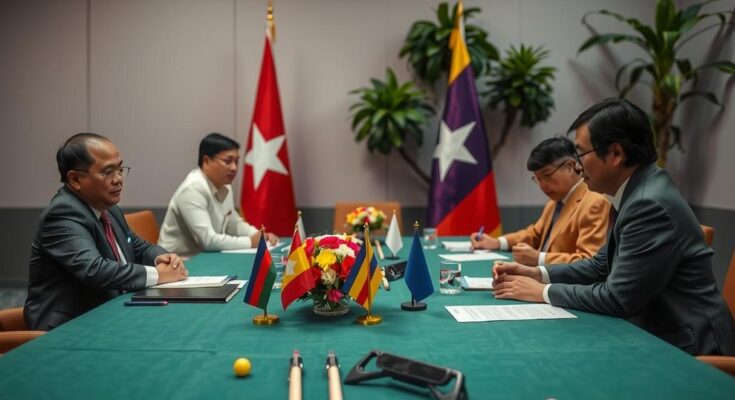Regional talks in Bangkok focus on the escalating violence in Myanmar following the 2021 military coup that ousted Aung San Suu Kyi. Attended by foreign ministers from neighboring countries, these discussions aim to address the ongoing civil conflict that has emerged from the military’s repression of pro-democracy protests, leading to unrest and the formation of armed resistance groups.
In Bangkok, regional discussions addressing Myanmar’s ongoing political turmoil have commenced, gathering foreign ministers and representatives from neighboring nations, including Laos, China, India, and Bangladesh. This meeting represents yet another attempt to navigate the complex crisis that has enveloped Myanmar since February 2021, when the military forcibly removed Aung San Suu Kyi’s elected government, instigating widespread civil unrest and violence. The long-standing conflict has resulted in the formation of an armed resistance against the military junta and deepening instability in the region.
The political crisis in Myanmar began with the military coup in February 2021, which led to violent confrontations between the military authorities and pro-democracy supporters. This coup not only disrupted the fragile democratic structure established after decades of military rule but also ignited a civil war that has caused significant suffering for the civilian population. International responses have been fragmented, leading to various regional discussions aimed at finding viable solutions to restore peace, yet meaningful progress remains elusive.
The talks convened in Bangkok highlight the urgency of addressing Myanmar’s civil war and the regional implications of continued instability. Despite numerous discussions over time, a cohesive strategy for restoring peace and governance in Myanmar remains to be established. The commitment of neighboring countries to engage in dialogue demonstrates a recognition of shared responsibility in potentially resolving the ongoing crisis.
Original Source: www.wdrb.com




